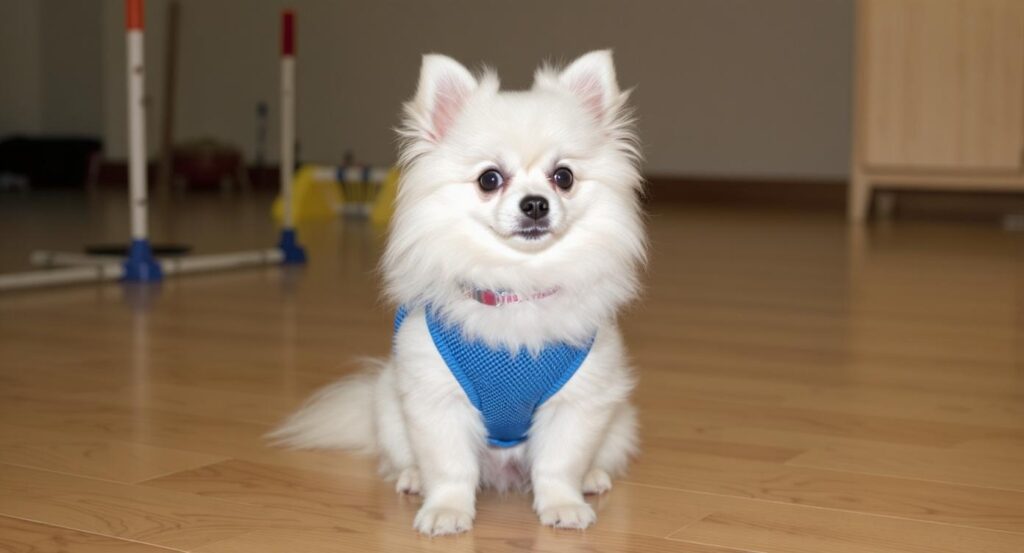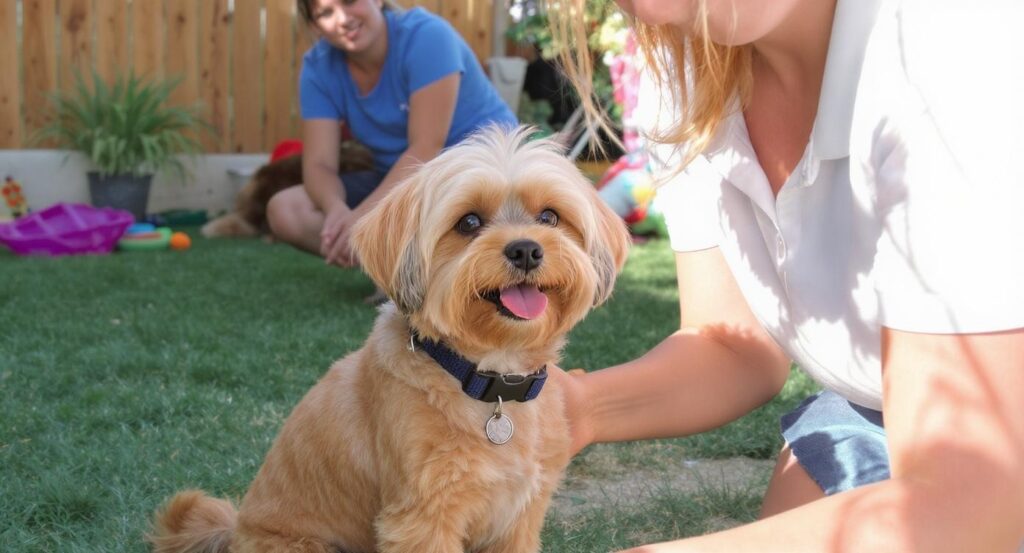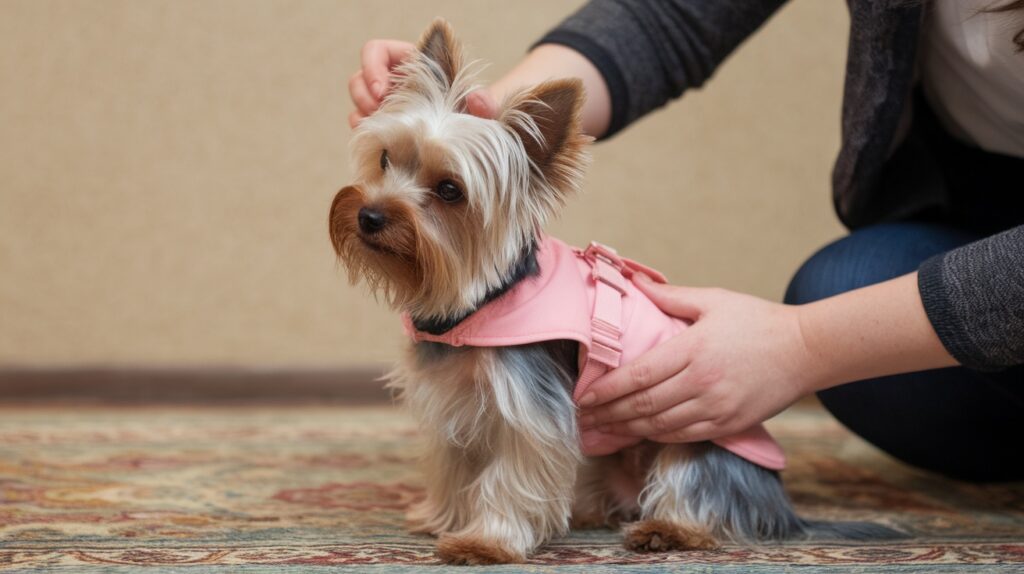Raising a Pomeranian is rewarding, but it’s not always simple. These little dogs are clever, alert, and buzzing with energy.
They need the right guidance early on to grow into calm, confident companions. Early socialization gives your Pom the tools to handle new people, places, and situations without fear or stress.
The habits you build in those first few months really matter. Meeting new people and exploring different environments shapes their confidence and manners.
Let’s walk through a handful of genuinely practical ways to make those early weeks count.
Start socializing between 3 to 14 weeks for best results
The best time to start socializing your Pomeranian is between 3 and 14 weeks old. Puppies at this age are way more open to new sights, sounds, and experiences.
It’s a sweet spot for building positive habits. You can introduce your pup to gentle handling, different people, and calm pets.
Keep the experiences short and upbeat so your puppy feels safe. Carry your puppy outside, let them hear new noises, or introduce them to a calm dog.
These small steps boost their confidence and reduce fear later. If you wait too long, your Pomeranian can still learn, but it usually takes more patience.
Introduce your Pom to new people gently and regularly
Let your Pom meet people in a calm setting first. Keep those early interactions short and sweet so your pup doesn’t get overwhelmed.
Offer praise or a treat to help your dog link new faces with good things. Expose your Pom to people of different ages, voices, and appearances.
It helps your dog realize that variety is normal, not scary. Let your Pom approach at their own pace, and encourage gentle petting.
Invite friends or family over one at a time. Avoid big groups at first—too many people can make your Pom nervous.
Controlled introductions build confidence. Take your Pom on short trips to places like a park or pet-friendly store.
Meeting strangers in different environments teaches your dog to handle new situations calmly. Watch their body language so you know when to step back.
Make these meetups a regular thing. Frequent, gentle practice helps your Pom grow into a more relaxed and friendly companion.
Use treats and praise to create positive associations
When you introduce your Pomeranian to something new, bring along small treats. A quick reward helps your pup connect new experiences with something enjoyable.
This makes them more likely to stay calm and curious. Praise works just as well as food.
A cheerful voice and gentle petting can reassure your dog when they face new people, sounds, or places. Your reaction shows them that the situation is safe.
Keep rewards consistent. Give a treat or praise right after your pup shows calm behavior.
Timing matters because it helps your Pomeranian understand what they did right. You don’t need to go overboard—short, positive moments are enough.
With steady rewards, your dog learns that new things usually lead to something good.
Expose your Pom to different sounds like vacuum or traffic
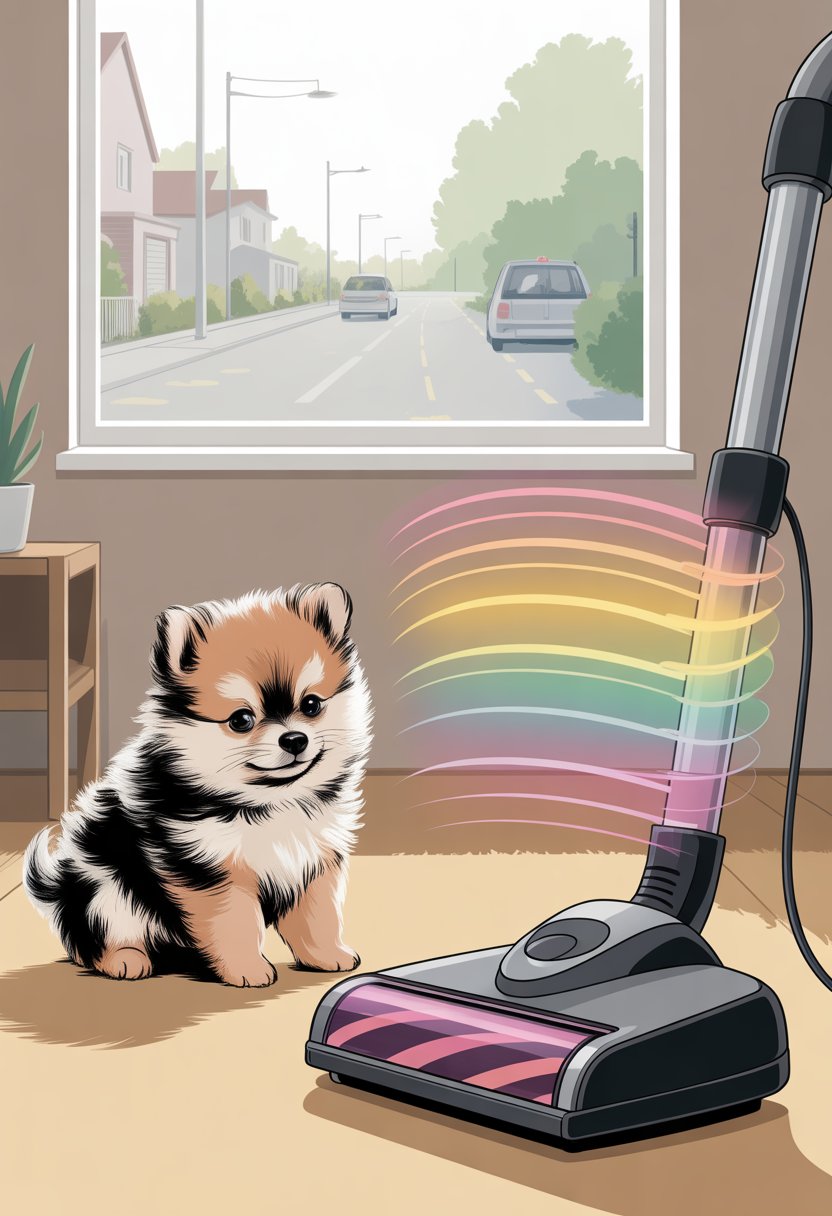
Your Pomeranian will hear plenty of noises in daily life. Getting them used to these early makes a big difference.
Sounds like vacuums, traffic, or doorbells can seem scary if they’re new. Start small so these noises aren’t overwhelming.
Turn on the vacuum for a short time while your pup is in the room. Stay calm and offer a treat so they connect the sound with something positive.
If they seem nervous, lower the volume or move the vacuum farther away. You can also play recordings of traffic or sirens at a low level.
Gradually raise the volume as your Pom gets more comfortable. This gives them practice without the stress of being outside right away.
Daily life brings other sounds too—kitchen timers, hairdryers, or even a blender. Let your Pom hear these in a safe space while you act relaxed.
Your calm behavior shows them there’s nothing to worry about. Mix in short sessions with different noises so your pup doesn’t get overwhelmed.
Keep it light and positive, and always end on a good note with praise or a treat.
Arrange playdates with calm, friendly dogs
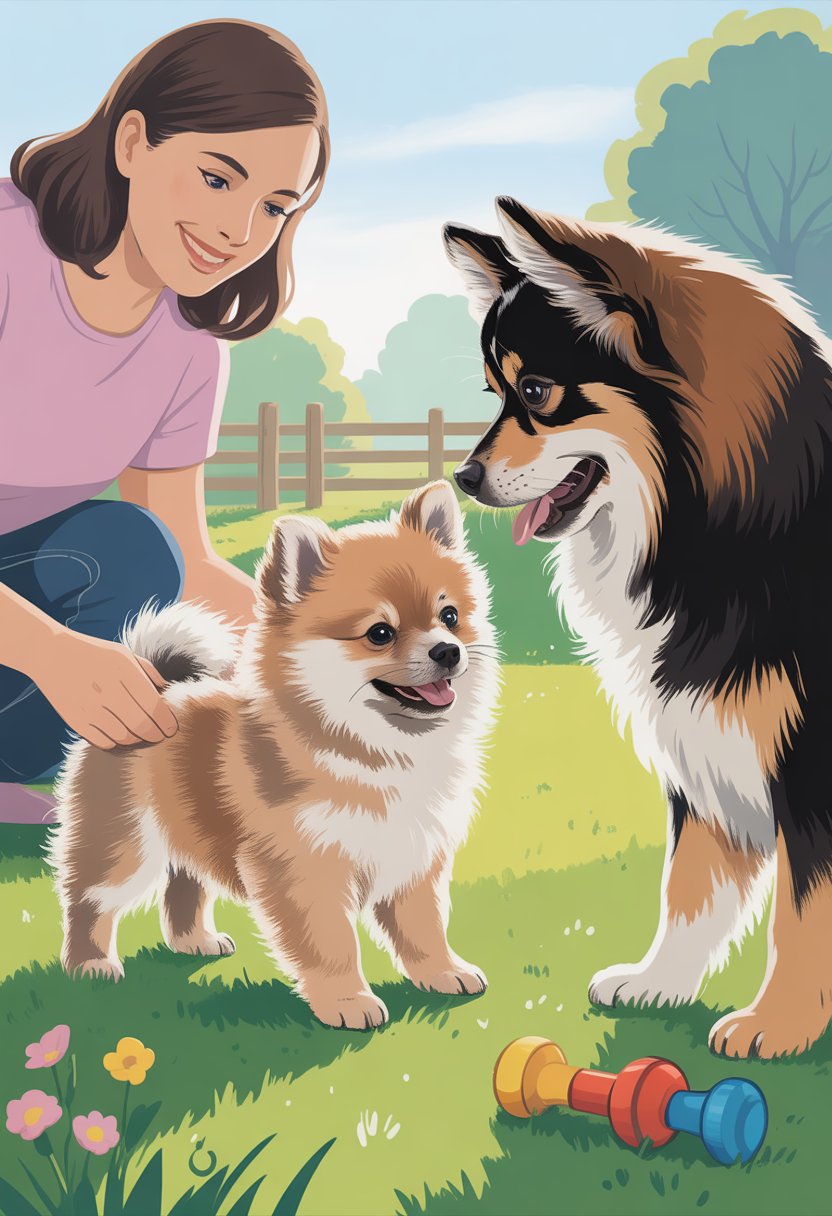
Set up playdates with dogs that are calm and well-mannered. This helps your Pomeranian feel safe and learn how to interact without stress.
A relaxed playmate can guide your pup toward good habits. Keep the first few playdates short and always supervise.
Watch body language so you can step in if your pup gets nervous or overwhelmed. Short, positive sessions build confidence.
Pick safe, neutral spaces like a fenced yard or quiet park. Avoid crowded or noisy areas that could make your Pomeranian anxious.
A calm setting makes it easier for your pup to focus on the interaction. Bring treats or a favorite toy to reward good behavior.
Praise your Pomeranian when they greet politely or play gently. This reinforces that calm, friendly interactions are a good thing.
As your pup gets more comfortable, slowly increase the length of playdates. Meeting different friendly dogs teaches your Pomeranian how to adjust to various play styles.
This variety helps your pup grow into a more balanced companion.
Take short trips to varied environments like parks or pet stores
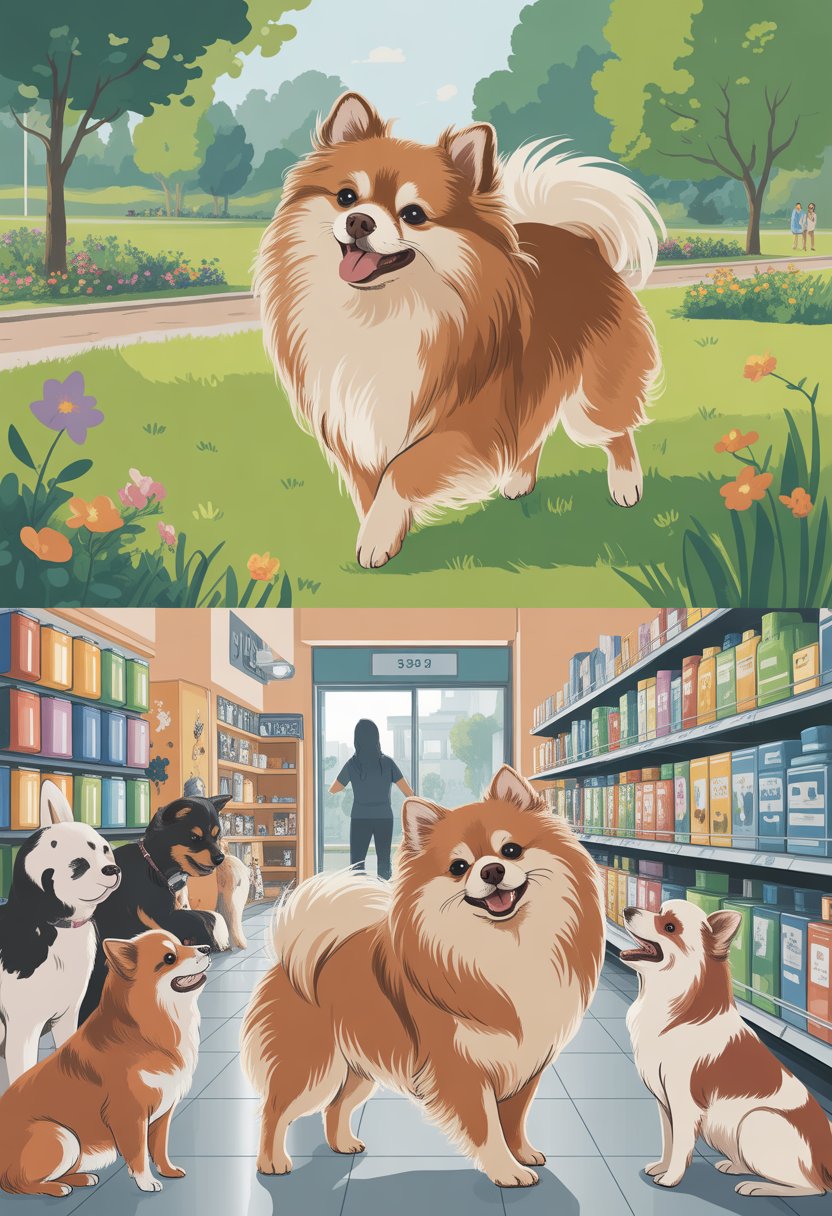
Start by taking your Pomeranian on short outings to safe, dog-friendly spots. Parks, pet stores, and outdoor cafes are good choices.
They give your pup a chance to see and hear new things. Keep the trips brief so your puppy doesn’t get overwhelmed.
These outings help your dog get used to different sights, sounds, and smells. Meeting new people or seeing other dogs from a distance can build comfort.
Always watch your pup’s body language so you know when it’s time to take a break. Bring treats to reward calm behavior in new places.
A small snack after a positive interaction helps your puppy connect new environments with good experiences. Carrying a favorite toy can also make your dog feel more secure.
As your Pomeranian gets more comfortable, slowly increase the length of each trip. Try walking down a busy street one day, then visiting a quieter area the next.
Mixing up the locations keeps the experiences fresh. If your pup seems unsure, give space and let them explore at their own pace.
Gradually introduce new objects like umbrellas or hats
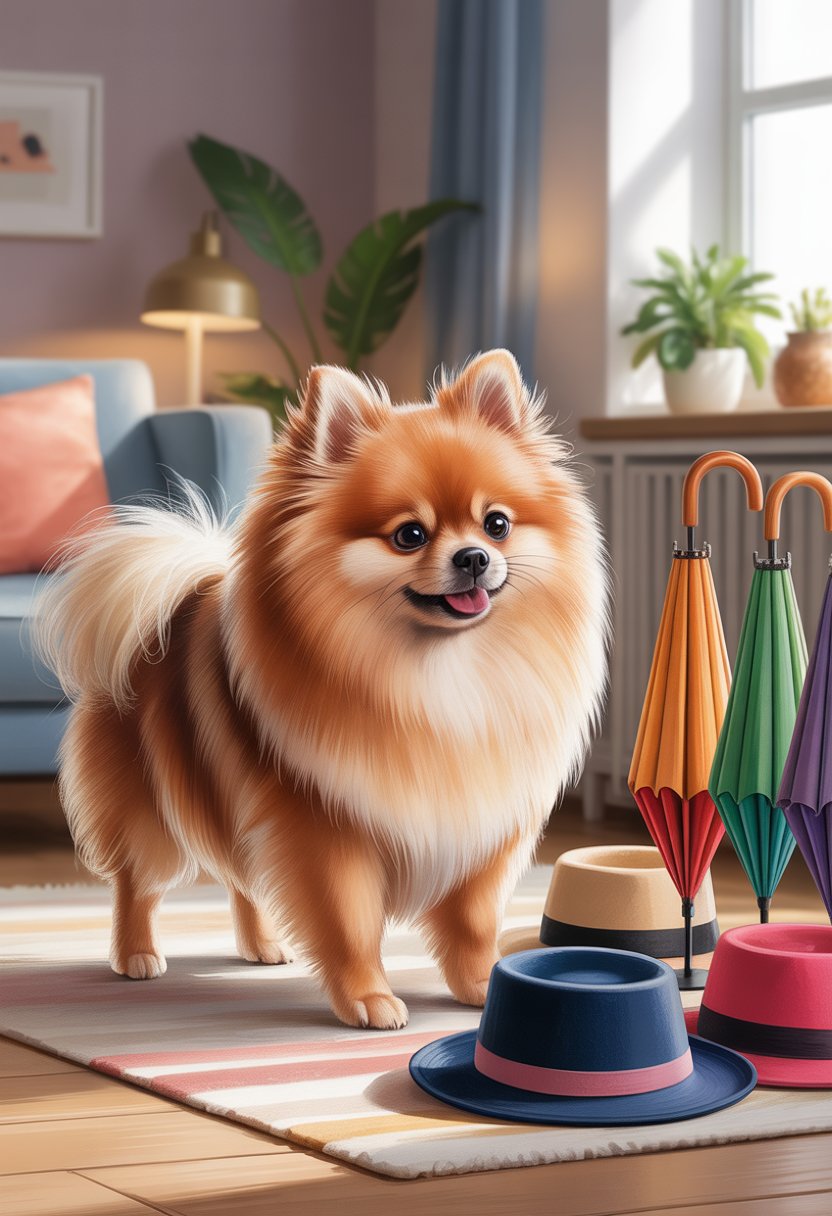
Your Pomeranian might find everyday objects like umbrellas, hats, or coats a little weird at first. These items can look big or move in ways that seem unusual to a small puppy.
Start slow. Place the object on the ground and let your puppy sniff it.
Give a treat or some praise when they show calm interest. This helps your pup connect the new object with something positive.
Once your puppy is comfortable, move the object gently. For example, open an umbrella slowly while keeping a relaxed tone.
If your pup stays calm, reward them again. Try adding hats or jackets by wearing them around your puppy.
Let them get used to how you look with different clothing. Keep the sessions short so your pup doesn’t feel overwhelmed.
Repeat these steps in different rooms or settings. The more variety your puppy sees, the more confident they become.
Over time, your Pomeranian will treat these items as a normal part of their world.
Keep socialization sessions short and fun to avoid stress
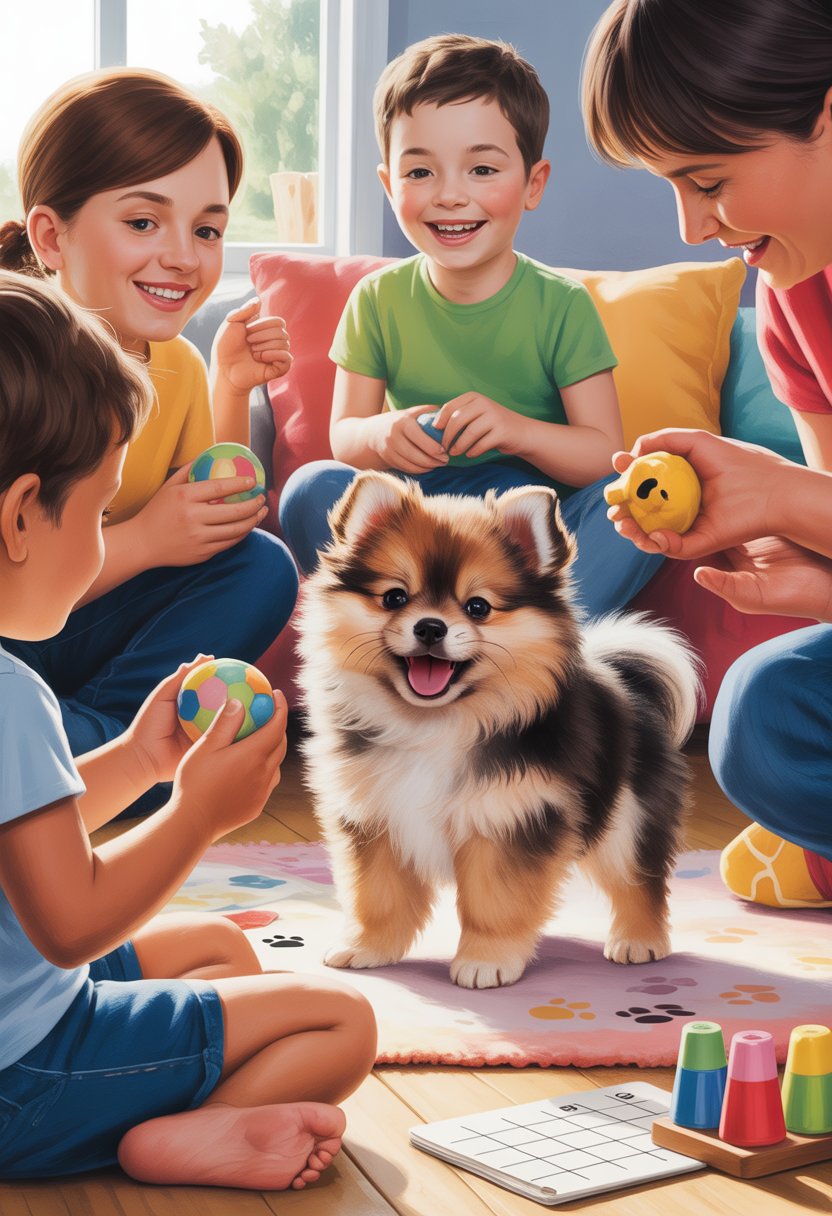
When you’re working on socializing your Pomeranian, it’s better to keep sessions brief. A few minutes of positive exposure is often more helpful than a long, drawn-out activity.
Your puppy learns best when they feel safe and relaxed. If you stretch the time too much, they might get overwhelmed and start to associate new people or places with stress.
Focus on making each session enjoyable. Use treats, toys, or gentle praise to reward calm behavior.
It’s smart to end on a positive note. Stopping while your puppy is still happy keeps them wanting more next time.
By keeping things short and fun, you give your Pomeranian a chance to build confidence without feeling pressured.
Avoid overwhelming your Pom with too many new experiences at once
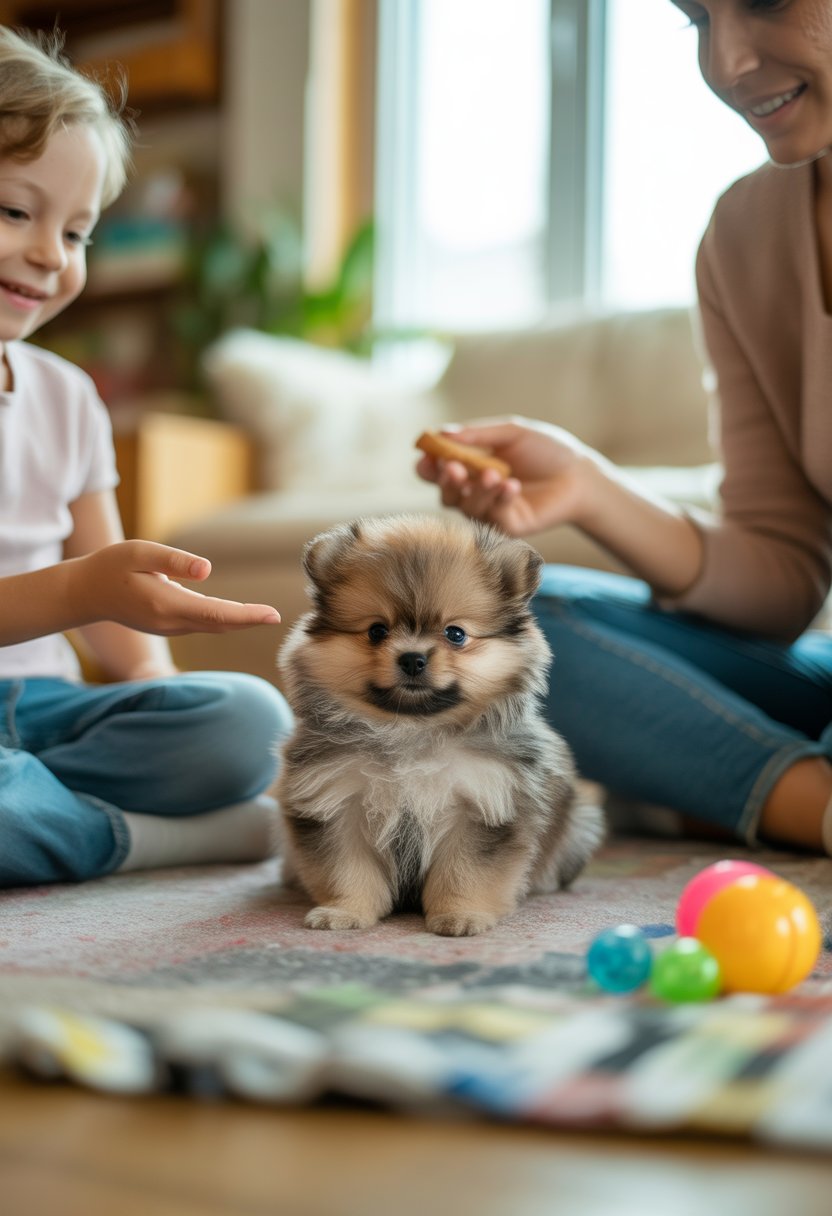
When you start socializing your Pomeranian, it’s tempting to introduce them to everything right away. But too much at once can make your pup anxious or fearful.
Focus on one or two new experiences at a time. For example, take your Pom to meet a friend’s calm dog one day and then visit a quiet park the next.
Watch your puppy’s body language. If they seem stressed, give them space and slow things down.
It’s better to build confidence step by step than to rush. Keep each new experience short and positive.
A few minutes of calm exposure works better than a long, overwhelming session.
By pacing the process, you help your Pom feel safe while still learning to handle new sights, sounds, and people.
Why Early Socialization Matters for Pomeranians
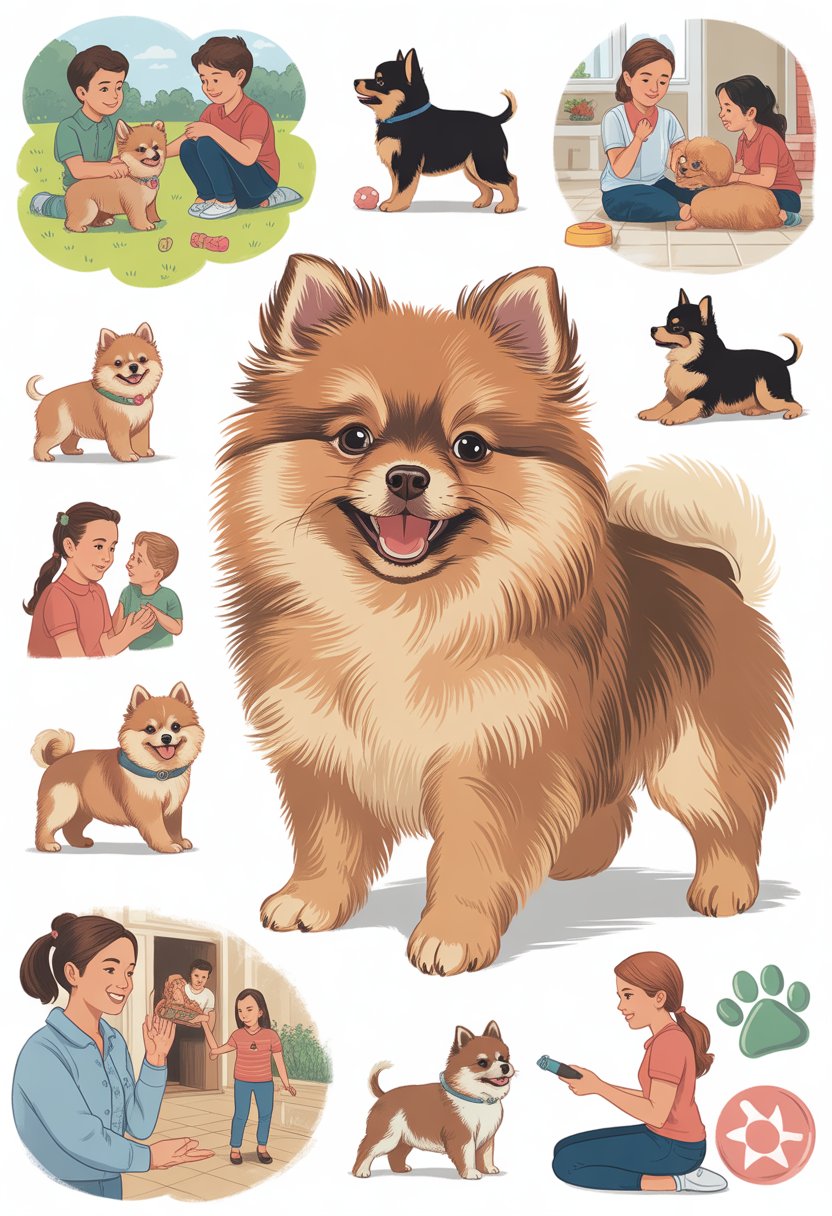
When you start socializing your Pomeranian early, you help them feel safe in new places and around new people or animals. It can also lower the chance of bad habits like barking too much or acting out when they’re nervous.
Building Confidence in Your Pup
A young Pomeranian can get overwhelmed by loud sounds, new faces, or busy environments. Early socialization gives your pup small, positive experiences so they learn that new things aren’t scary.
You might take them on short walks in different areas or let them meet calm dogs. Sometimes, inviting friends over to interact with your pup works wonders.
These short sessions help your Pom build trust and stay relaxed. Confidence grows when your dog has repeated positive moments.
For example:
- Meeting new people: Offer treats when they greet politely.
- Exploring new spaces: Start with quiet areas, then slowly add more activity.
- Handling and grooming: Touch their paws, ears, and mouth so they get used to it.
Preventing Behavioral Issues
Without early socialization, Pomeranians might bark at strangers, act shy, or show fear-based aggression. These behaviors usually come from not knowing how to handle new situations.
Make socialization part of daily life. Introduce your Pom to different sounds like doorbells, vacuum cleaners, or traffic.
Pair these moments with calm praise or treats so they connect the noise with something good. Regular exposure helps lower separation anxiety.
If your dog learns early that being alone is normal, they’re less likely to cry or act destructive later.
Common Socialization Mistakes to Avoid
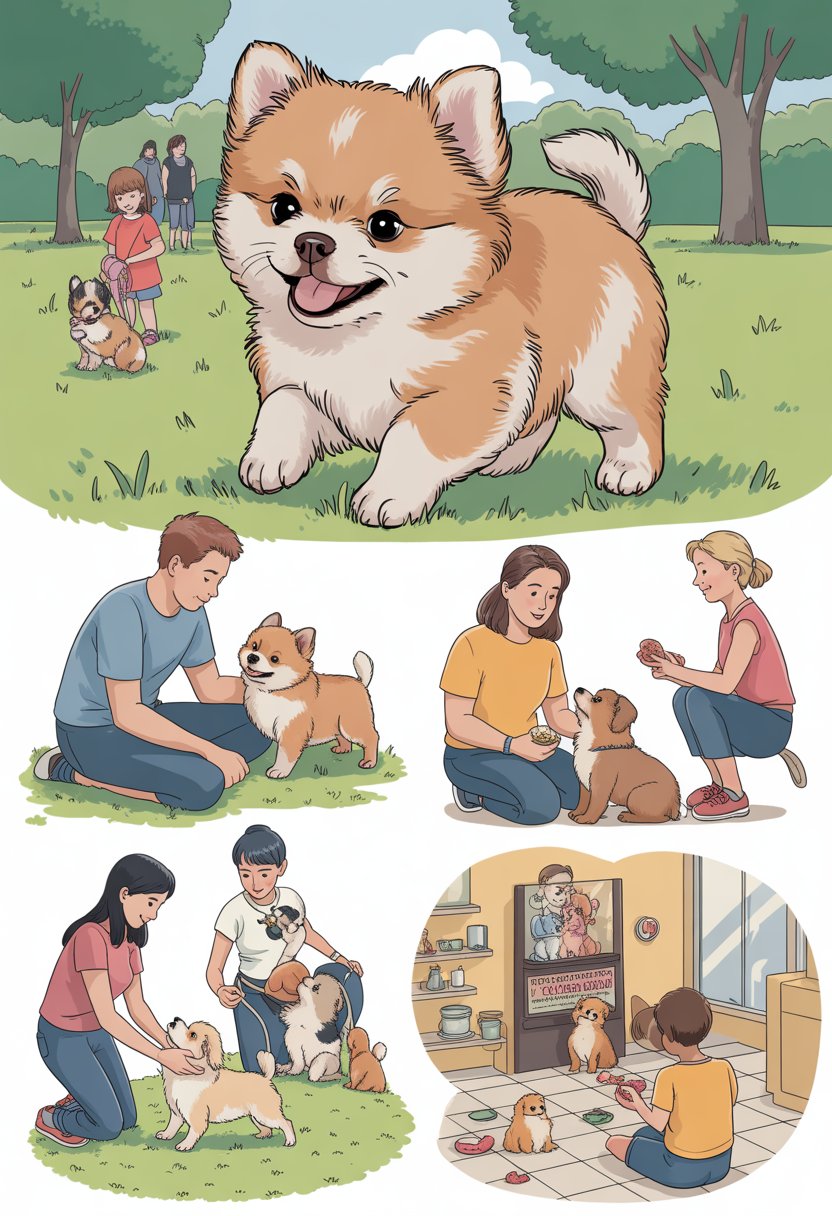
Your Pomeranian needs steady, positive exposure to the world. But certain missteps can slow progress.
Rushing experiences or waiting too long to start can both create problems that last into adulthood. It happens more than you’d think.
Overwhelming New Experiences
It’s tempting to think more exposure is always better, but flooding your Pomeranian with too much at once can backfire. Loud noises, crowded places, or meeting too many people in a short time can stress them out instead of building confidence.
Pay attention to your dog’s body language. Tucked tails, shaking, or avoiding eye contact mean your pup feels uncomfortable.
If you push through these signals, your dog may learn to fear instead of adapt. Start small and build up.
For example:
- First step: short visits to quiet areas
- Next step: meeting one calm dog or person
- Later step: busier places with more distractions
This slower approach gives your Pomeranian the chance to feel safe and learn at their own pace. And honestly, isn’t that what you’d want if you were in their paws?
Missing Key Socialization Windows
Puppies go through a critical learning window between 3 and 14 weeks old. During this time, your Pomeranian is especially open to new sights, sounds, and people.
If you miss this stage, it gets tougher for your dog to adjust later on. But honestly, socialization doesn’t just stop at 14 weeks.
Keep introducing your pup to new things as they grow. Early exposure lays the groundwork, while later experiences just add to it.
Try to mix things up during those early weeks:
- People: men, women, kids, folks in hats or uniforms
- Places: car rides, parks, sidewalks
- Sounds: vacuum, doorbell, traffic
Make these introductions gentle and positive. That way, your Pomeranian is less likely to develop fear-based behaviors as they get older.

